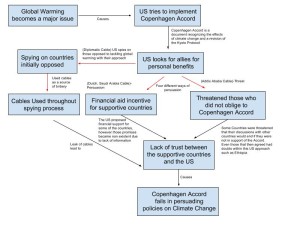2) This diagram shows the global rise in the issue of climate change which eventually lead to the creation of the Copenhagen Accord. Many countries were aware of the increase in global warming, however the US believed that the only way to fix this problem was to implement the Copenhagen Accord. This accord was an alternate form of the Kyoto Protocol and was one that would benefit the US greatly. However, there became an issue of finding other countries to support this law. Therefore, the US tried to gain allies of not only the big countries, but the under developed ones too. There were many approaches that the US used as persuasion which included money, threats, spying and cables. As explained in my diagram financial aid was used as an incentive to those who chose to support the Copenhagen Accord while also threatening those who opposed it. In regards to the threats some countries chose to accept the consequences addressed by the US and some chose to agree to terms such as Ethiopia. In regards to the tactic of spying the US managed to adhere certain cables of which each country could be bribed with. With all of these approaches there became a lack of trust among those countries due to the fact that some questions could not be answered. For example, one of those being that the US could not answer what form of financial aid these countries would receive i.e. cash etc. Due to this lack of trust and knowledge this resulted in the failing of the Copenhagen Accord and the failing in persuading policies on Climate Change.
3) Contrary belief climate change is mainly comprised of human’s interaction and activity in regards to the greenhouse gases. This issue can be compared to the module lessons on ethics and collective action. In helping the environment, we as a society need to not consider these virtue ethics but rather ethically act in order for the ends to justify the means. If we take action on this issue, the means could lead to healthy and sustainable environment. Its these environmental ethics that correspond to the concept of collective action. Climate change is one that affects everyone on this planet, no matter what the country. We can make ends justify the means, however it is very hard to do that without the cooperation of all parties involved. According to WikiLeaks, the United States had taken it upon themselves as an individual interest to change climate change for the sake of our country, no one else’s. This is proved through evidence of the spying and sending of cables. Instead of negotiating, the US also created ultimatums for countries who opposed the Copenhagen Accord. All of these tactics and self interests didn’t provide a solution but rather provided the same outcome as before. These actions therefore influenced my view on the State Department cables. I believe these cables should have been made public. The US was using these cables as a source of espionage in order to gain support from those countries and that is neither fair nor ethical. Despite these unethical decisions made by the US, it is still tough to say what should be done. I think we should start with reducing emissions of greenhouse gases by requiring an education program teaching each country of their fossil fuel use and how it can be reduced within that specific area. This could influence certain companies, vendors etc. to make a change in order to benefit their country. As you can see climate change has and will continue to be a rising area of concern and if we continue this trend our sustainability as a planet will be in danger.


Hi alj5291, my name is Chris and I really enjoyed your post. Here’s a link to my post if you want to take a look. http://geog030.dutton.psu.edu/2016/04/06/the-politics-of-climate-change-mod9/. Your diagram is clear and nicely organized. It has a nice mix of details and larger concepts that the details tie to. I took a different approach in creating my diagram by focusing on broader categories, but I think both approaches work. I agree with you in your post that the U.S. needs to influence climate change policy for the worlds and not just our own interests. However, I really think the ends justify the means and that limiting the government will hinder their ability to affect change.
My name is Julie, and I am a sophomore at Penn State Worthington Scranton! Here is a link to my post: http://geog030.dutton.psu.edu/2016/04/06/module-9-climate-change-julie-cardillo/
I talked about my post about how trust was lost because the US bribed and threatened other countries to sign the accord too. I agree that this deals with ethics and collective action because the US was very unethical and this is something that needs to be done together . We all need to come together to solve it, and bribing and threatening is not going to cut it. I also talked about how countries should be educated too, because I feel that if those countries were educated about the benefits of reducing greenhouse gas, then they would have cooperated.